Past Activities & Events
September 18-21, 2019
Conference
Metacognition in Multilingual Development:
From multilingual children to polyglots
Obergurgl, Austria
Details can be found here.
February 2018
Interview in the OE1-programme „Dimensionen“ with Lena Hallwirth - 12.02.2018
Listen to interview (German; 24:46): Prof. Ulrike Jessner-Schmid (16:55)
Article about LAILA & LAILA-BICS in the journal "Wissenswert-Magazin" - Edition February 2018
Link to the article (in German)
June 2017
Latest study: MELA
Bolzano - In June a new study concerning multilingualism will be launched in the Ladin kindergartens. Prof. Ulrike Jessner-Schmid presented it at the Ladin education department.
The new inquiry about multilingualism is called “MELA (MEhrsprachig LAdinisch - Multilingual Ladin)” and will be initiated in June in the kindergartens of Val Gardena and Val Badia. The extensive study, which comprises five phases, has been elaborated by Professor Ulrike Jessner-Schmid of the Leopold-Franzens-University of Innsbruck. The aim of the study that has been introduced in detail at the Ladin education department, is to scrutinize language competence of children in the early years. The examination pursues a holistic approach and is based on the linguistic system of the common underlying proficiency. The first results are expected by 2019. The study is being financed at the request of the member of the provincial government Florian Mussner by the region Trentino-Südtirol. The realisation of the study is assigned to the Ladin school and culture in terms of innovation and consultation as well as to the supervisory authority and the management of the Ladin kindergartens.
Click here to go to the project's homepage.
Article (in German)
February 2017
Multilingualism in South Tyrol - What is possible?
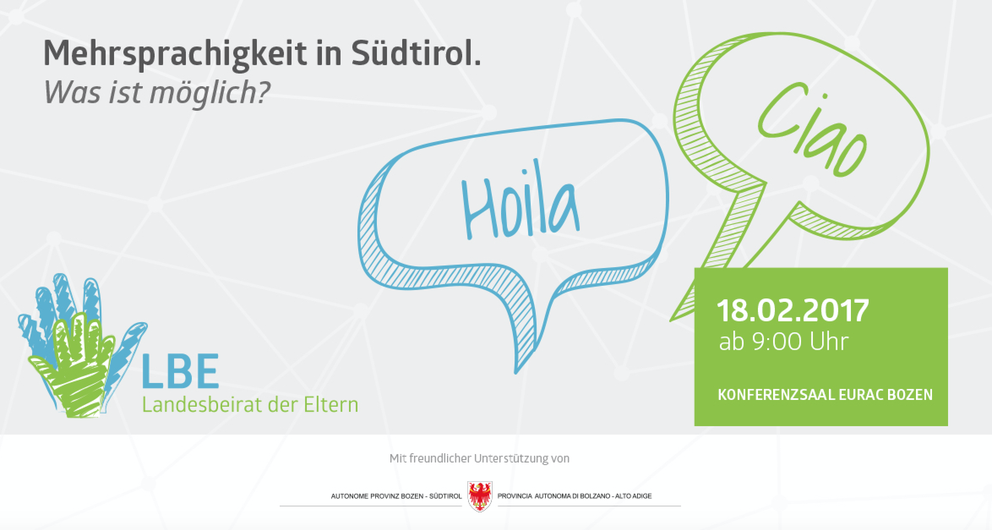
Video of Prof. Ulrike Jessner-Schmid's contribution (M-factor)
Link to videos of the contributions of other keynote speakers and various newspaper articles
September 2016
10th International Conference on Third Language Acquisition and Multilingualism
Vienna, Austria
Lecture: “Building on the M-factor: Strategies in decoding an unknown language”
May 2016
18th Summer School of Psycholinguistics
Balatonalmádi, Hungary
Lecture: “Multilingual awareness in Ln learners’ strategies and processing”
February 2016
AIANI Guest Lecture: „Language (Education) Policy in Israel”
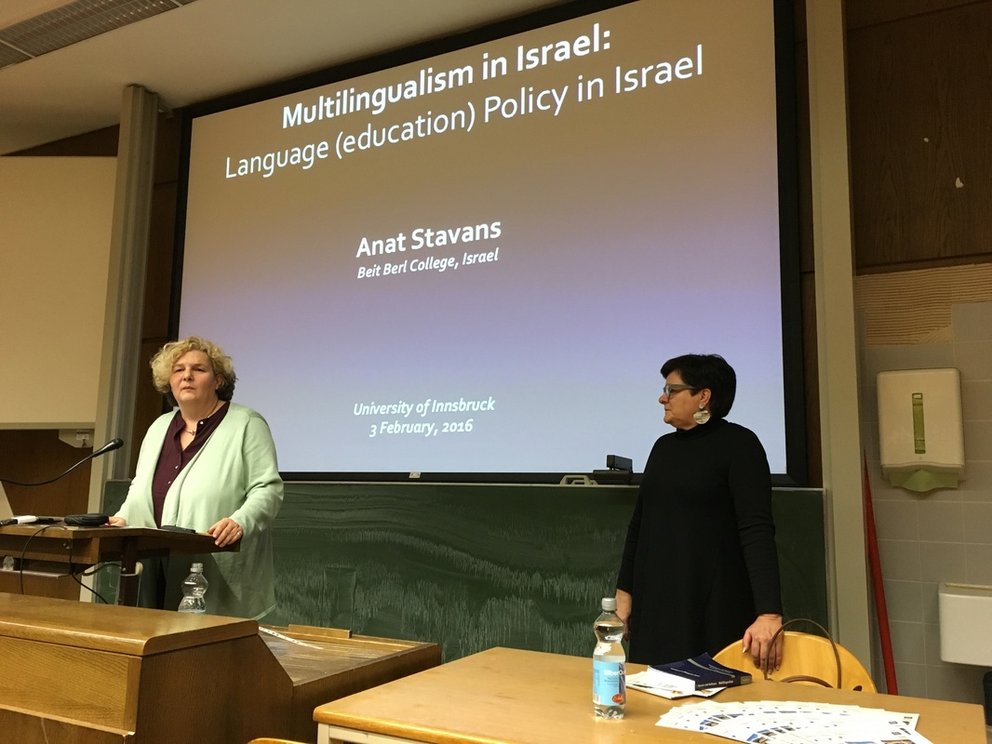
October 2015
DyME awarded Arthur Haidl-Prize 2015
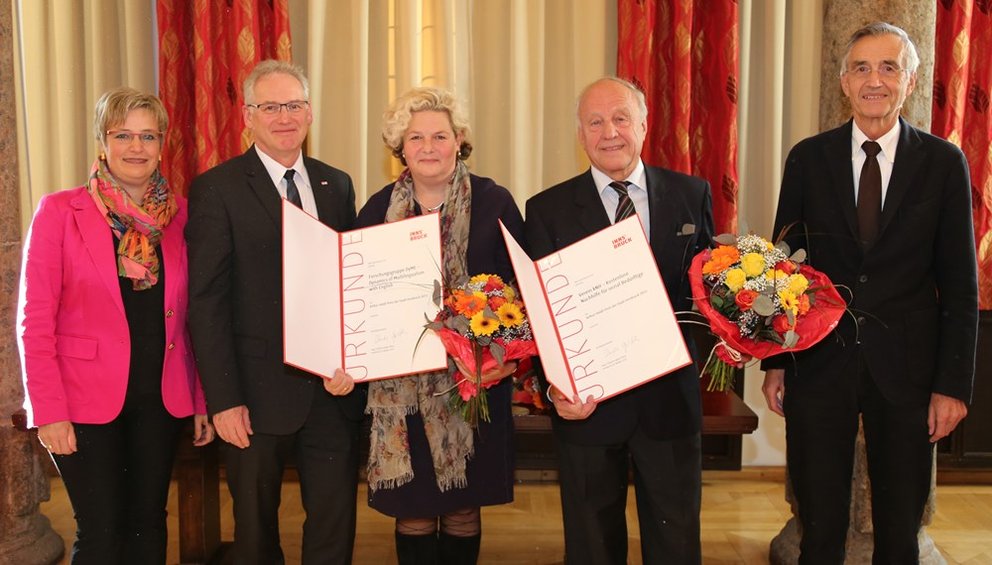
Award winners and jury at the ceremony of the Arthur-Haidl-Prize 2015 (from left): Head of Department Birgit Neu (MA V - Society, Culture, Health and Sports), Innsbruck’s Chief Executive Director Bernard Holas (jury member), Ulrike Jessner-Schmid ("DyME - Dynamics of Multilingualism with English"), Helmut Zander (association "KNH - free tutoring for people in need) and Rector of Innsbruck University Tilmann Märk (jury member).
May 2015
Multilingualism research awarded the quality label RECC (Regional Educational Competence Center)
May 13th, 2015, Vienna
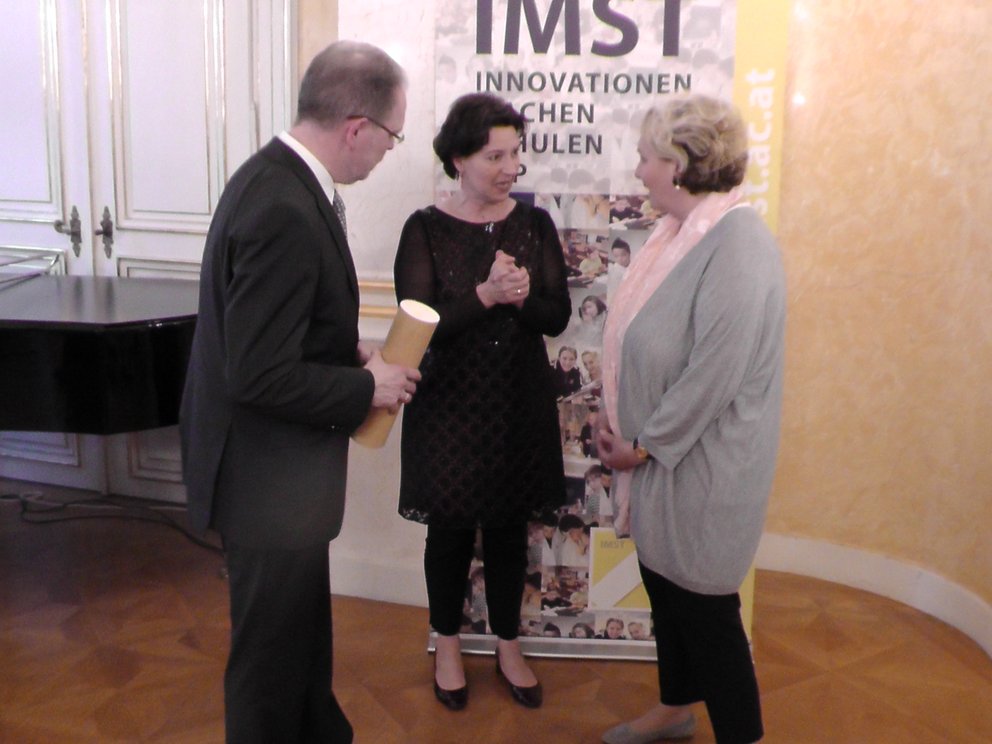

Spring 2014
Symposium "Multilingualism as Chance. Theory and Practice”
27.03.2014
Leopold-Franzens University Innsbruck
„Every new language is like an open window that shows a new view of the world and expands your attitude towards life.“
(Frank Harris)
The symposium took place in connection with the exhibition land.schafft.sprache – tirol ist mehrsprachig (21.03.2014 – 16.05.2014 Barockkeller Hofburg, Innsbruck). Within the scope of the symposium, experts from the filed gave plenary talks on current issues in multilingualism research. In the afternoon, best-practice-examples from different schools and kindergardens were presented in different workshops.
Tyrol is perhaps best known for its breath taking Alpine landscapes and for Innsbruck, the multi-faceted capital that is home to the University of Innsbruck, the biggest and most important research and educational facility in Western Austria. However, the role of Tyrol as a "land of many languages“ is unknown to most.
The exhibition ‘land.schafft.sprache - tirol ist mehrsprachig’ will be presented in spring of 2014 in theBarockkeller of the Imperial Palace (Kaiserliche Hofburg Innsbruck). It sheds light on the multilinguality of the city and allows visitors to take a closer look at the linguistic landscape of Innsbruck and Tyrol.
For further information please visit:
www.uibk.ac.at/anglistik/dyme/projects/land-schafft-sprache.html.en
2013
Aktion D. Swarovski KG 2013 - funding

Swarovski KG 2013 funding. Congratulations!
October 2012
Project in Tyrolean schools to give multilingualism a value boost.
Children create multilingual book together.
The 2011/12 school year saw the launch of a new project in Tyrolean schools: the aim is to boost the value of multilingualism and of the children's 'mother tongue'. As part of the project, children are encourated to be creative and express themselves in their heritage languages in the form of stories, poetry, etc. Valentina Török headed one such creative workshop in October 2012. The kids' creative output is to be published as a multilingual book featuring contributions in no fewer than eight languages.
For a German article from the regional press, click here.
The project also received an award from Dr. Claudia Schmied of the BMUKK (federal ministry for education, art and culture. Find out more here.
September 2012
8th International Conference on Third Language Acquisition and Multilingualism
Universitat Jaume I - Castellón (Spanien)
Universitat Jaume I - Castellón (Spanien)13 - 15 September, 2012
June 2012
The Magister thesis of DyME Member Jeanette Betsch (L2 and L3 attrition after four months? The role of metalinguistic awareness and implications for teaching) has been published in book form. For a preview or to order the book, go to the publisher's website.
May 2012
Silesia: 24th International Conference on Foreign/Second Language AcquisitionSzczyrk, Poland
Plenary by Ulrike Jessner:
Multilingual awareness: an emergent property of multilingual systems
April 2012
Interview with Ulrike Jessner-Schmid
A radio interview with Ulrike Jessner-Schmid, head of DYME, will be broadcast as part of the show "KulturTon - UniKonkret".
Station: Freirad 105,9 MHz
First Broadcast: Monday, April 16 2012, 18:30 - 19:00h
Repeat: Tuesday, April17 2012, 8:00 - 8:30h
March 2012
Symposium "Mut zur Mehrsprachigkeit - Daring to be Multilingual" a great success!The DYME Team would like to thank everyone who helped plan an organize the event, the speakers, and of course the many participants for making the symposium possible!
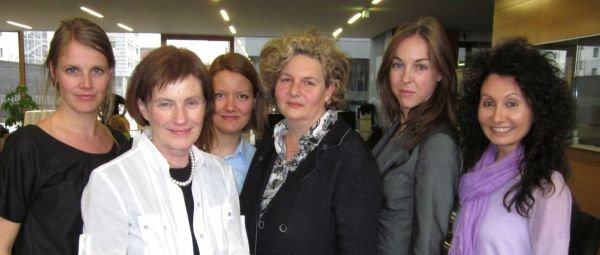
The DYME Team in Dornbirn
March 2012
Symposium: Mut zur Mehrsprachigkeit
(Daring to be multilingual)
(Daring to be multilingual)Thursday, 29 March 2012, 9.00 – 18.00 Uhr
Fachhochschule Dornbirn (Austria, Vorarlberg)
Link to one of our partners: Okay-Line
In the first part of the Symposium "Daring to be Multilingual", several renowned researchers and experts will give talks, present research and hold discussions on the dynamics of multilingualism. They include Britta Hufeisen (Germany), Claire Kramsch (USA), Ulrike Jessner (Austria) and Georges Lüdi (Switzerland). In the second part, participants will work in interest-based groups. Additional presentations (to be held in the form of a 'market') include examples of good practice and projects from schools.
The symposium aims to forge a stronger connection between theory and good practice in Vorarlberg, and to make existing projects in multilingualism accessible to a broader public. It is also intended to help put Vorarlberg on the map as a positive example of a multilingual region.
This event is being organized by the DYME research group (University of Innsbruck) in cooperation with the integration project okay.zusammen leben and the University of Applied Science in Dornbirn. The target includes all those interested in multilingualism, but in particular teacher/carers (pre-school, school, teacher training colleges), university students (in teacher training, pedagogy and social work), librarians, teachers in adult education and members of local government.
February 2012
Winter School: Multilingualism across the Lifespan
Fribourg (Switzerland)
Attended by Valentina Török and Kathrin Oberhofer, who gave a presentation on the LAILA Project.
December 2011
ICEM Conference
Castellon (Spain)November 2011
Impulstagung Bodenseeraum
Feldkirch (Austria)
October 2011
September 2011
Seventh International Conference on Third Language Acquisition and MultilingualismL3 Conference, Warsaw
June 2011
ISB8 - Oslo
March 2011
Šmihel nad Pliberkom / St. Michael ob Bleiburg
As part of a series of lectures and discussion under the heading „Bilingualsim - Our Region's Asset“ (created by Alpen-Adria-University in Klagenfurt and the MihelCatholic Cultural Society) Kathrin Oberhofer was invited to the Austrian region of Carinthia as a guest lecturer.
On the opening night, she gave a talk on "Bilingualism and Child Development" to a full house at the St. Michael community hall. In her lecture, she addressed common predjudices and fears in connection with child multilingualism, talked about the potential benefits but also the possible disadvantages of early bi/multilingualism and gave an overview on what research can tell us in this field. True to the spirit of the evening, the Q&A session following the talk was held in German and Slovenian.
"What prompted us to initiate this series of talks was the everyday oberservation that many Slovenian-speaking parents are not passing this gift of living bilingualism on to the next generation," said organizer Micka Opetnik in an article in the Kleine Zeitung. "This talk showed us that many parents need this support from the academic/scientific community to raise their self-esteem." A report in Slovenian from the paper Novice can be found here.
November 2010
Second Nötsch Symposium: "Multilingualism in Kindergarten and at School"
Nötsch im Gailtal, an Austrian township in the border region with Italy and Slovenia, is a member of the “Three Hands” Project (“Drei Hände – Tri Roke – Tre Mani”) that connects three kindergartens and primary schools in the region to develop and promote trilingual education. The founders’ vision is to create and implement a concept for continuous trilingual education from kindergarten to high school graduation. The project received the European Seal for Innovative Language Projects in 2007, and began holding an annual symposium on trilingualism in 2009.
Nötsch 2010: Michael Byram, Rico Cathomas, Elisabeth Allgäuer-Hackl, Vladimir Wakounig, Kathrin Oberhofer
As part of the Symposium, Elisabeth Allgäuer-Hackl and Kathrin Oberhofer were invited to give a talk on “Trilingual Development – What does research tell us?” at the second Nötsch Symposium. They were happy to oblige, to hear the plenary talks given by other experts in the field, and to attend the workshops held by teachers and practitioners from bi/trilingual kindergartens and primary schools, who shared their ideas and experience of early multilingual education in the field.
April 2010
Dynamic Systems Theory and Multilingual Development
Expert Workshop in Innsbruck
In April 2010, Prof. Ulrike Jessner-Schmid invited international experts on Dynamic Systems Theory / Complexity Theory (DST/CT) in Applied linguistics to Innsbruck to give talks and discuss the newest developments in the field. The two-day expert workshop was held in celebration of Prof. Diane Larsen-Freeman's (University of Michigan) Fulbright Professorship at the University of Innsbruck, and also served as a follow-up to the invited Language Learning Round Tables at the 2006 AAAL conferenc
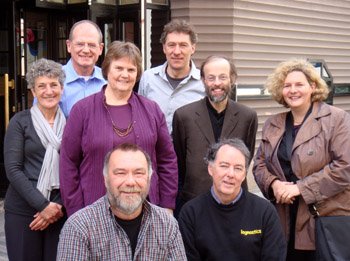
Kees de Bot (Rijksuniversität Groningen, Netherlands)
"Simulations and modeling: the best way forward or reductionism in disguise?"
Experts from around the world at the DST workshop
Philipp Herdina (Unversity of Innsbruck)
"Causality in dynamic systems"
Ulrike Jessner-Schmid (with Elisabeth Allgäuer-Hackl, both University of Innsbruck)
"Multilingual awareness: An emergend property in multilingual development"
Dianne Larson-Freeman (Univsity of Michigan, USA; fulbright professor at the University of Innsbruck)
"Finding a new way to talk about learning: Some questions"
Wander Lowie (Rijksuniversität Groningen, Netherlands)
"DST methods for SLD: aplications and limitations. Issues in modeling L2 development"
Paul Meara (Swansea University, Wales)
"Bootstrapping a (lexical) network"
Paul van Geert (Rijksuniversität Groningen, Netherlands)
"Dynamic network models of multilingual development: intra- and interindividual dynamics"
Marjorlijn Verspoor (Rijksuniversität Groningen, Netherlands)
"How to better represent L2 development within a DST perspective"
